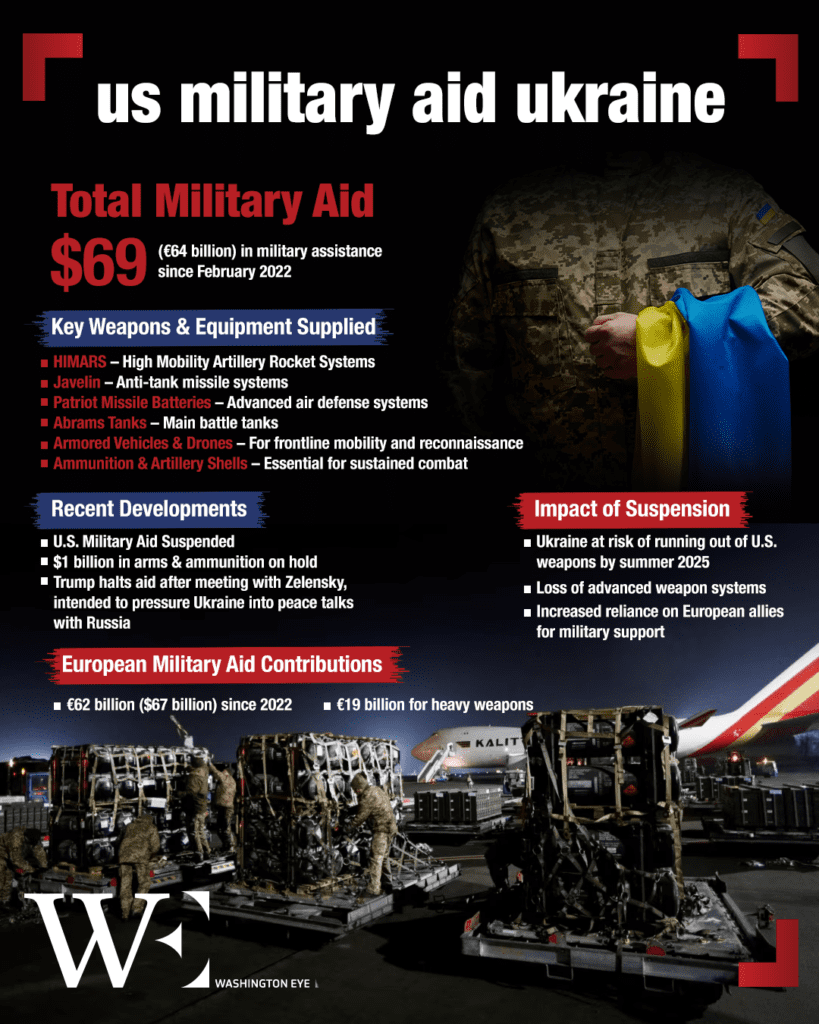In a significant policy shift, President Donald Trump has ordered a suspension of all U.S. military aid to Ukraine, following a contentious meeting with Ukrainian President Volodymyr Zelensky in the Oval Office on February 28, 2025. This decision has raised concerns among international allies and defense analysts about the potential impact on Ukraine’s ongoing conflict with Russia. The suspension of aid was precipitated by a heated exchange between Presidents Trump and Zelensky during their recent meeting.
Sources indicate that the confrontation arose over disagreements on the approach to peace negotiations with Russia. President Trump expressed dissatisfaction with what he perceived as Zelensky’s reluctance to engage in meaningful dialogue aimed at resolving the conflict. In the aftermath, Trump warned Zelensky that he “will not be around very long” unless he agrees to a peace deal, underscoring the administration’s frustration with the current Ukrainian stance.
Scope and Immediate Effects of the Suspension
The suspension encompasses all military assistance not yet delivered to Ukraine, including critical weapons systems such as Javelin anti-tank missiles and other military equipment. This move halts arms deliveries that were approved under the previous administration, though it remains unclear if ammunition for existing systems will be affected. The decision reflects a significant departure from the robust support previously extended to Ukraine and signals a reevaluation of U.S. foreign policy in the region.
White House officials have articulated that the pause in aid is intended to pressure the Ukrainian government into committing to peace negotiations with Russia. Vice President JD Vance emphasized that America’s economic interest in Ukraine would serve as a better security guarantee than military troops, suggesting a strategic pivot toward leveraging economic tools over military support. The administration has also indicated that the aid review aims to ensure that U.S. assistance contributes to a peaceful resolution rather than perpetuating an indefinite conflict.
Reactions from Ukrainian Officials
The Ukrainian government has expressed dismay over the sudden suspension of military aid. Ukrainian officials have shown signs of yielding to U.S. demands, with Zelensky’s chief of staff indicating that a rare metals deal with the U.S. will soon be signed. Additionally, Ukrainian MP Oleksiy Goncharenko advised Zelensky to apologize to Trump to prevent further deterioration of relations, highlighting the internal pressures faced by the Ukrainian leadership in navigating this diplomatic crisis. The suspension of U.S. military aid has elicited concerns among European allies and defense analysts. There is apprehension that this move could weaken Ukraine’s defense capabilities against Russian aggression and embolden Russian military strategies in the region. European leaders are reportedly working to formulate a peace plan to present to President Trump, aiming to mitigate the potential destabilizing effects of the aid suspension on European security.
Under the previous administration, the United States played a crucial role in supporting Ukraine’s defense efforts. Congress passed bills allocating approximately $175 billion in aid, with about $110 billion already delivered. This assistance was pivotal in bolstering Ukraine’s resistance against Russian military advances and maintaining its sovereignty. The current suspension marks a stark contrast to prior U.S. commitments and raises questions about the future trajectory of U.S.- Ukraine relations. The decision to suspend military aid has sparked debate within the United States. Critics argue that the move undermines a key ally and could destabilize the region, while supporters contend that it is a necessary step to encourage diplomatic resolutions and reassess U.S. foreign aid expenditures. The internal divisions within the Trump administration and the Republican Party regarding foreign policy toward Ukraine have become more pronounced in light of this development.
The White House has not specified the exact conditions under which military aid to Ukraine would resume. However, officials have indicated that a demonstrable commitment from President Zelensky to engage in peace negotiations with Russia is a critical factor. The administration’s stance suggests that future U.S. support will be closely tied to Ukraine’s diplomatic actions and willingness to seek a peaceful resolution to the ongoing conflict. President Trump’s decision to suspend military aid to Ukraine represents a pivotal moment in U.S. foreign policy, with far-reaching implications for international relations and regional stability. As the situation unfolds, the global community will be closely monitoring the actions of both the U.S. and Ukrainian administrations, as well as the responses from other key international stakeholders, to assess the potential outcomes of this significant policy shift.















